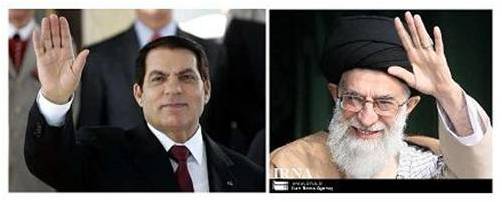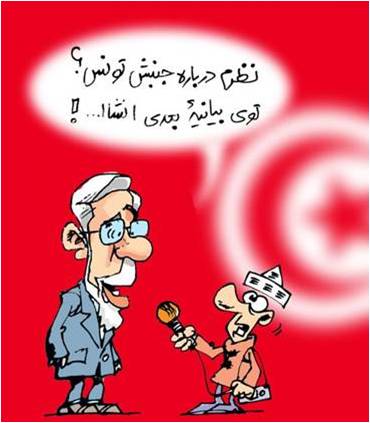BETWEEN ZAYN AL-‘ABIDIN BIN-‘ALI AND ‘ALI KHAMENE’I

Number 43 ● 24 January 2011
BETWEEN ZAYN AL-‘ABIDIN BIN-‘ALI AND ‘ALI KHAMENE’I: THE IRANIAN PUBLIC DEBATE FOLLOWING THE POPULAR REVOLT IN TUNISIA
Raz Zimmt*
On January 14, 2011, Tunisia's President, Zayn al'-'Abidin bin 'Ali, was overthrown in a popular uprising in Tunisia. This event has generated intense interest around the world, including in the Islamic Republic of Iran, where it has presented Iranian authorities with a serious dilemma: On one hand, Bin-'Ali led a secular pro-Western regime which for years suppressed Tunisia's Islamic movement, led by Shaikh Rashed al-Ghanushi of the Islamist organization al-Nahdha ("the Revival"). On the other hand, the riots in Tunisia erupted merely a year and half after the Iranian regime suppressed its own popular demonstrations following the re-election of President Ahmadinejad on June 12, 2009.
The similarities between the recent events in Tunisia and the post-election unrest in Iran in 2009, may account for the Islamic Republic's cautious statements in response to the popular uprising taking place in Tunisia. The spokesman for the Iranian Foreign Ministry, Ramin Mehmanparast, stated that the various parties and groups operating in Tunisia should make every effort to restore the state's national security. He noted that Iran has been monitoring developments in Tunisia very closely, but emphasized that the evolving situation was Tunisia's domestic affair. The Speaker of the Majlis, 'Ali Larijani, also responded cautiously to the events in Tunisia. He praised Tunisian citizens for fighting for their rights, while at the same time warned that various foreign countries may exploit the situation for their own advantage.
Iranian officials attempted to avoid exacerbating existing tension between the Islamic Republic and several Arab states by refraining from public statements suggesting that events in Tunisia might be affecting the stability of Arab regimes in the region. However, in contrast to diplomatic public statements from Iranian officials during the events in Tunisia, the media in Iran reflected Iranian hopes for similar changes in Arab states, particularly those associated with the moderate Arab camp.
The conservative daily Jomhuri-ye Eslami maintained that the events in Tunisia reflect the political crisis of almost all the Arab states. On January 16, 2011, an editorial published in Jomhuri-ye Eslaminoted that many Arab states have been governed by authoritarian and repressive leaders for many decades, and the developments in Tunisia will certainly affect these governments. Another article indicated that the uprising in Tunisia has also been alarming for Western states, especially the United-States and Israel. This concern, according to the Iranian daily, stems from the fear that a new regime may shift away from the pro-Western policies implemented by the deposed Tunisian president, who, according to Jomhuri-ye Eslami, was a central ally of Israel in the region (Jomhuri-ye Eslami, January 16, 2011).
The daily Kayhan argued that the popular uprising in Tunisia is expected to spread to other Arab countries dominated by despotic and corrupt regimes that do not enjoy popular support. Kayhan further stipulated that the experience of the past few decades proves that Iran's religious democracy is the governing model most worthy of emulation in the region. The Iranian regime which combines Islam and Republicanism is the only model that has proven its ability to resist tyranny and imperialism and to ensure the region's security (Kayhan, January 18, 2011).
The daily Mardom Salari, identified with the traditional conservative faction in Iran, also addressed the impact of the developments in Tunisia on other Arab states. A January 16 article, published in Mardom Salari, emphasized that the revolutionary wave, which started with the Islamic Revolution in Iran (1979) and has now emerged in Tunisia, will continue because the desire for democracy is expanding throughout all the states of the region. It further emphasized that this is a natural process because Arab states have been ruled for more than two decades by leaders who ignore the rights of domestic opposition. Therefore it can be expected that their fate will be similar to that of bin-'Ali, and sooner or later their rule will also come to an end. The article also claims that developments taking place in Saudi Arabia, where reform-seekers demand the removal of restrictions from the political opposition, and in countries such as Kuwait and the United Arab Emirates, where social activists have expanded their activities into the political arena, suggest that democracy is the only way to achieve progress and development in the region. The article further expressed hope that the events in Tunisia will encourage other Arab leaders to establish democracy and pay more attention to the will of their peoples.
While the mainstream Iranian media is identified almost entirely with the conservative faction of the Islamic Republic's politics, critics of the Iranian government from the reformist opposition camp focused on comparing the Tunisian anti-regime movement to the 2009 post-election demonstrations in Iran. Since most of the reformist publications have been shut down by the authorities in recent years, the reformist debate on the uprising in Tunisia was conducted through the Internet and addressed by Iranian bloggers. Some of the bloggers expressed hope that the Iranian people will eventually bring about a political change in their country as well. A blogger identified as Mansour Irani expressed his wish that like the Tunisian president, the spiritual leader 'Ali Khamene'i will eventually hear the voice of the people in Iran (noor afkan, January 14, 2011). Another blogger wrote that after the Tunisian people forced their president to flee the country, it was now the Iranian people's turn to do the same. The Iranian people, according to the blogger, have more reasons than the Tunisians to do so. Unlike the Tunisian president, the blogger continued, Iran's president was elected in a fraudulent election, and he is responsible for the state's economic crisis which is the worst in its history (greenilam1, January 14, 2011).

The Blog Zoorabad made this visual comparison between "bin-'Ali [and] 'Ali Khamene'i" (Zoorabad, January 14, 2011)
In light of the success of the popular protest movement in Tunisia, many Iranian bloggers have expressed their frustrations with the reformist opposition's failure to bring about political change in Iran. One Iranian blogger claimed that the people in Tunisia succeeded in a struggle which lasted only two weeks, while the Iranian people have been struggling for more than a year and their resistance has amounted to no more than statements by the reformist opposition leaders (vision, January 14, 2011) (see also the cartoon). Another blogger wondered why the protests in Tunisia were successful while protests in Iran failed, giventhat economic conditions are worse in Tunisia than in Iran.Tunisia, he argued, has an unemployment rate of 13.3 percent compared with Iran's 20 percent unemployment, and economic growth in Tunisia in 2010 was 3.7 percent, while Iran's economic growth was less than one percent (newperson1, January 14, 2011).

[Mir-Hossein Musavi]: "My opinion regarding the movement in Tunisia? [I'll address it], Inshallah, in a future statement!"
A cartoon by Nik Ahnag Kowsar, published in the website khodnevis (January 15, 2011).
The Iranian regime's supporters did not ignore the comparison between the events in Tunisia and the protest movement in Iran either. In response to such associations, the daily Kayhan stressed the proper analogy should actually compare the Iranian "anti-revolutionary" opposition to the deposed Tunisian President, who operated in the service of Western imperialism and fled to Saudi Arabia. Unlike the rise of the Tunisian people against their president, Kayhan continued, the Iranian people expressed their support for the government and dislike for the opposition, which is associated with the United States in particular and the West in general (Kayhan, January 16, 2011).
It is important to note that this is not the first time a popular uprising in the region generated varied reactions in Iran. In April 2010 similar reactions were stirred in Iran following the coup d'etat in the former Soviet republic of Kyrgyzstan which toppled the government of President Kurmanbek Bakiev.
Whereas supporters of the reformist opposition in Iran highlighted the success of the popular protest in Kyrgyzstan and compared it with the post-election movement in Iran, supporters of the Iranian government claimed this event reflected the continued erosion of the United States global status. Accordingly, the US support of the ousted Tunisian president further indicates the failure of the US foreign policy in the eyes of the Iranian regime's supporters. The Iranian debate regarding the regional protest movements and popular uprisings reflects the fiercest internal tensions within Iranian politics. It demonstrates how various political factions in the country take advantage of such events to strengthen their positions in both the domestic and foreign politics of Iran■
* Raz Zimmt is a junior research fellow in the Center for Iranian Studies and a Ph.D. student in the School of History at Tel Aviv University.
T h e C e n t e r f o r I r a n i a n S t u d i e s ( C I S )
Tel Aviv University, Ramat-Aviv 61390, Tel Aviv P.O.B. 39040, Israel
Email: IranCen@post.tau.ac.il Phone: +972-3-640-9510
F a x : + 9 7 2 - 3 - 6 4 0 - 6 6 6 5
Iran Pulse No. 43 ● January 24, 2011
© All rights reserved

